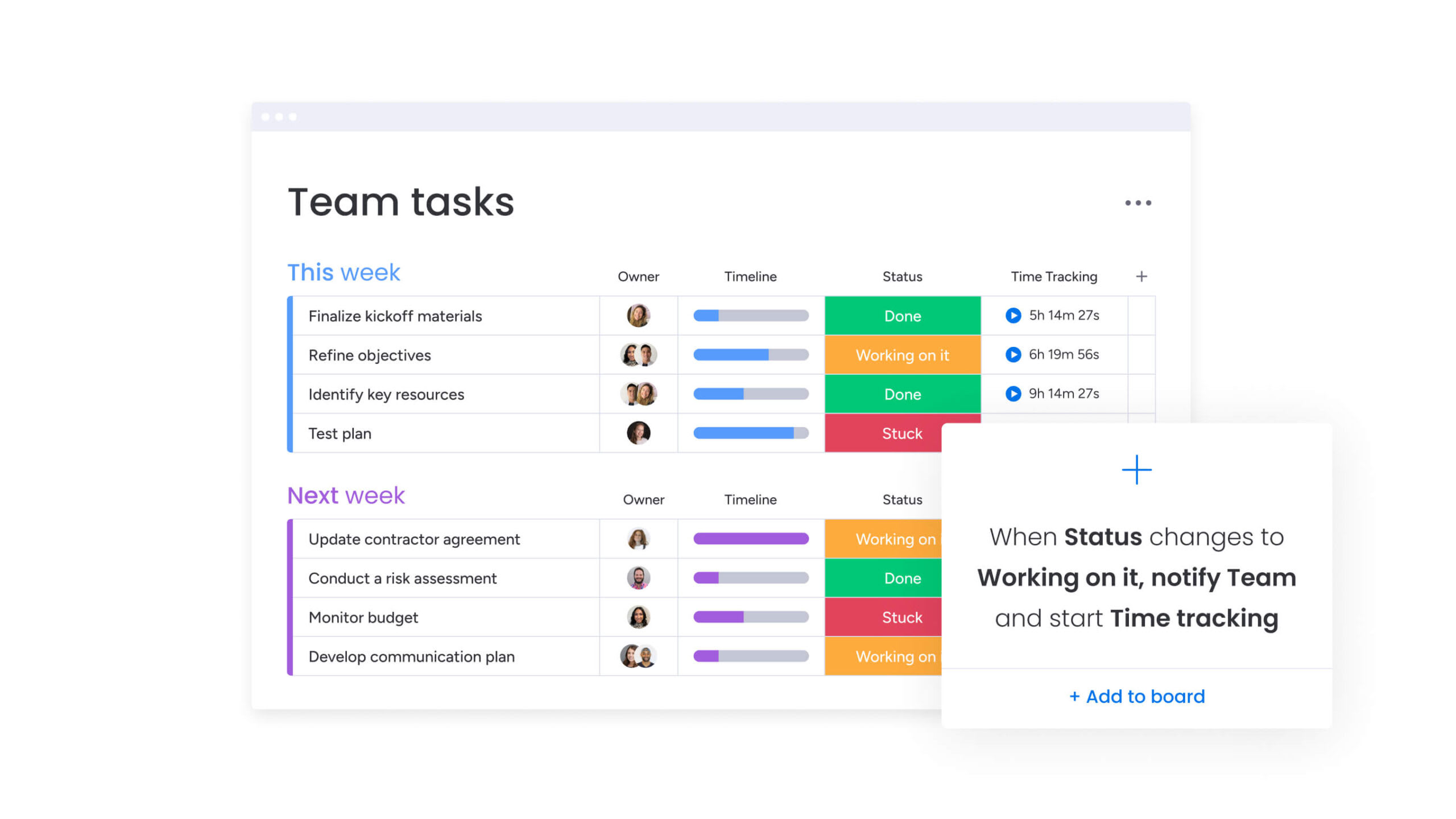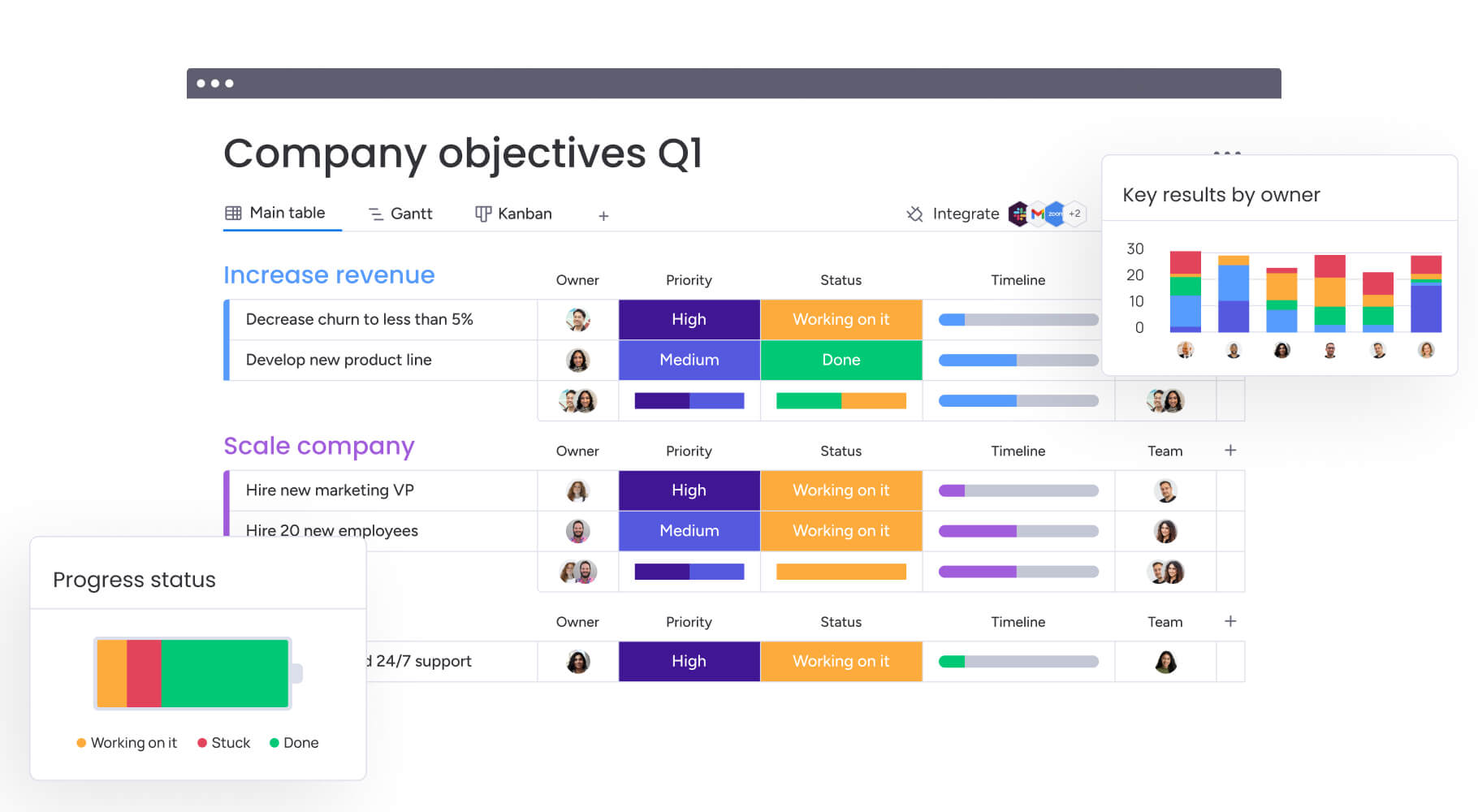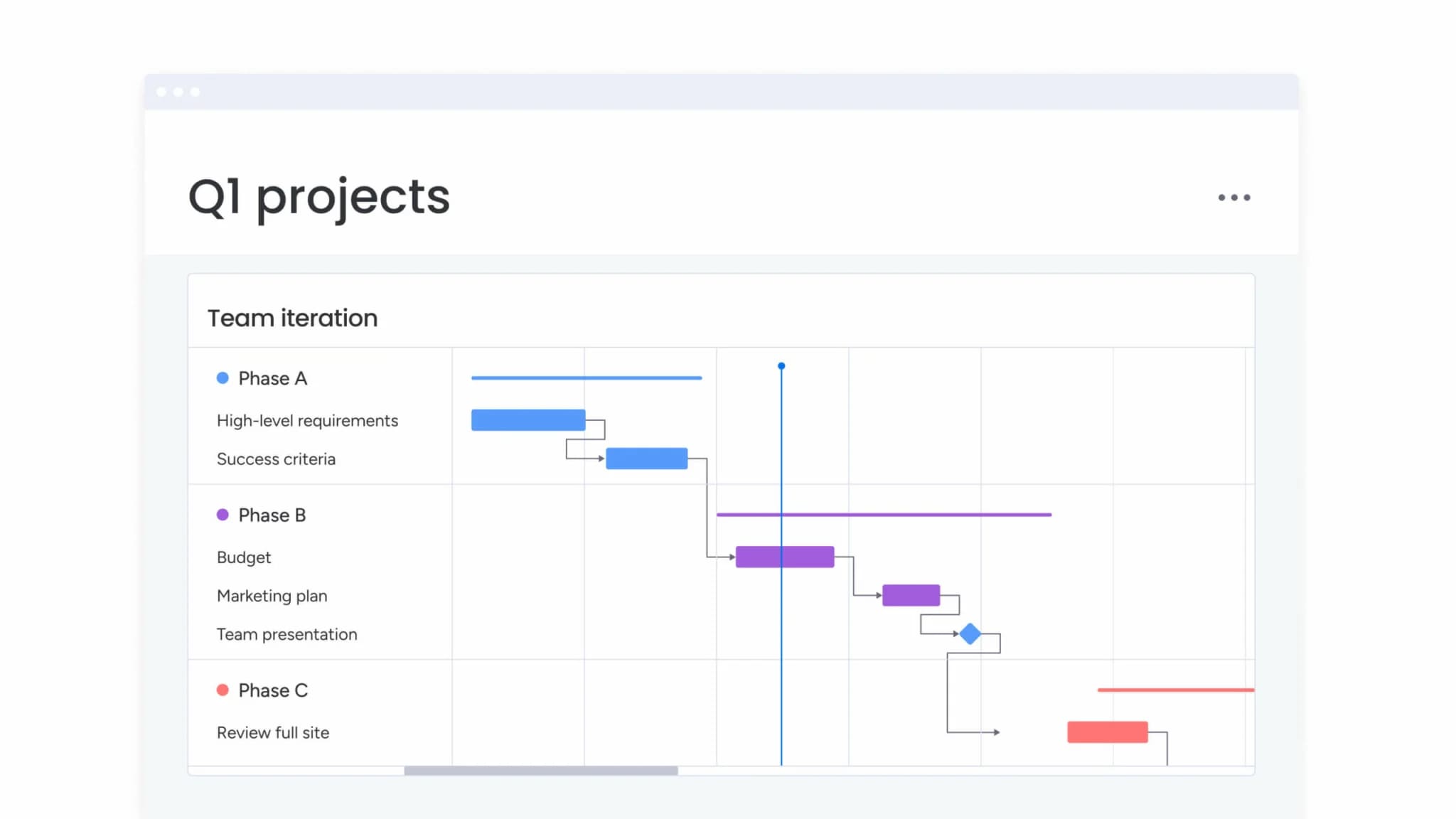Teams often use process management and project management as if they mean the same thing, but they shape work in very different ways. One brings structure to the routines your business depends on every day. The other helps you deliver a unique outcome with a clear start and finish. When those lines blur, teams end up treating repeatable workflows like projects or running long-term initiatives as if they were simple checklists.
Getting clear on the difference can transform how your organization works. It becomes easier to align expectations, plan resources, and give teams the clarity they need to move forward with confidence. You can spot inefficiencies faster, improve collaboration across departments, and create a more predictable environment for both routine work and major initiatives.
This handy article helps you understand what each discipline involves, how to tell them apart in real situations, and how they support each other as your business grows. You’ll also learn where teams often struggle and what strong alignment looks like in practice, whether you’re shaping a new process or driving a project to the finish line.
Key takeaways
-
Different purposes: process management supports repeatable work, while project management drives one-time outcomes.
-
Clearer decisions: knowing which model you need helps teams plan resources and set realistic expectations.
-
Stronger alignment: both disciplines work best when organizations define ownership, goals, and success metrics upfront.
-
Fewer bottlenecks: separating processes and projects reduces rework and keeps daily operations running smoothly.
-
Unified platform: monday work management gives teams one place to manage ongoing workflows and project-based work.
What is process management?
Process management focuses on how your organization handles work that repeats every day, week, or month. It involves analyzing these routines, improving them over time, and ensuring they run the same way no matter who is involved. The goal is consistency. When a process works well, teams avoid bottlenecks, reduce waste, and deliver predictable outcomes.
A process has no fixed end point. It evolves as your business grows, customer expectations shift, or new tools become available. Strong process management means regularly reviewing how work flows, identifying gaps, and making small improvements that add up over time.
Common examples of business processes include:
-
New employee onboarding.
-
Customer support ticket resolution.
-
Procurement and invoice approvals.
-
Weekly content publishing.
Effective processes form the backbone of a scalable organization. They create the foundation that projects build upon and allow teams to focus on higher-value work instead of reinventing steps each time.

What is project management?
On the other hand, project management guides work that has a clear beginning, end, and specific goal. A project is created to produce something new, whether that is a product, service, event, or internal improvement. Once that outcome is delivered, the project is complete.
Project management brings structure to this temporary effort. It involves defining the scope, building a plan, coordinating people, planning resources, and keeping the work on track from start to finish. Most projects move through phases such as initiation, planning, execution, monitoring, and closure, each with its own set of responsibilities.
Examples of common projects include:
-
Launching a marketing campaign.
-
Implementing new software.
-
Constructing a building or physical space.
-
Designing a new product feature.
Where processes prioritize consistency, projects prioritize delivery. Strong project management helps teams meet deadlines, stay within budget, and achieve the outcome the business needs.
Process management vs project management: key differences
Even though process management and project management often support the same teams, they approach work from very different angles.
One focuses on keeping routine operations predictable, while the other drives a unique outcome that moves the business forward. When teams understand these distinctions, it becomes much simpler to assign the right people, set realistic timelines, and avoid confusion about what “success” looks like.
The table below breaks down the major distinctions across goals, timelines, structure, and flexibility so you can quickly identify which approach fits your situation.
| Dimension | Process management | Project management |
|---|---|---|
| Goal | To standardize, optimize, and repeat a workflow for efficiency and predictability. | To deliver a unique, one-time outcome or result. |
| Timeline | Ongoing and cyclical, with no defined end date. | Temporary, with a clear start and end date. |
| Scope | Focused on a repeatable set of tasks. | Defined by a unique set of deliverables and objectives. |
| Metrics for Success | Efficiency, quality, cost reduction, and consistency. | Meeting the project goal on time and within budget. |
| Team Roles | Functional teams performing their regular duties. | Cross-functional teams assembled for the project’s duration. |
| Flexibility | Change is incremental and focused on continuous improvement. | Change is managed through formal change control processes. |

When to use each approach
Choosing between a process and a project often comes down to the type of work in front of you. Some work repeats on a regular schedule and benefits from a consistent structure. Other work is temporary and leads to a one-time outcome. When you can recognize which category your work falls into, planning becomes much easier.
You’re likely dealing with a process when the steps repeat frequently and follow a predictable pattern. The goal is to deliver consistent results and improve efficiency over time. For example, onboarding new employees or reviewing weekly invoices typically fits this model.
-
Process indicators: the work repeats, follows a set sequence, and benefits from small ongoing improvements.
-
Process purpose: create reliable outcomes and reduce variation in day-to-day operations.
Project management makes more sense when you are delivering something with a clear finish line. These initiatives are time-bound, involve cross-functional coordination, and lead to a new outcome once completed.
-
Project indicators: the work has a defined start and end date, includes unique deliverables, and requires structured planning.
-
Project purpose: bring a specific idea or initiative to life within an agreed scope and timeline.
How process management and project management work together
Even though processes and projects serve different purposes, they rely on each other more than most teams realize. A strong process often creates the foundation a project needs to succeed, and a well-run project can introduce or improve a process that becomes part of daily operations.
Think about a team rolling out new software. The rollout itself is a project with a clear ending. Once the software is in place, the way employees use it becomes an ongoing process that needs to be refined and maintained. In many organizations, this handoff repeats constantly as new initiatives turn into long-term workflows.
Processes also support projects in the opposite direction. When your organization already has reliable processes for communication, approvals, procurement, or quality checks, projects run more smoothly because teams aren’t reinventing the basics every time.
-
Projects create processes: new tools, systems, and workflows often begin as one-time initiatives before becoming part of daily work.
-
Processes support projects: consistent routines give teams the structure they need to execute projects without unnecessary delays.
-
Both drive improvement: when you review what worked well in a project, the insights often shape stronger processes moving forward.
When these two disciplines are aligned, teams can move between routine operations and larger initiatives with less friction and more confidence.
Benefits of aligning processes and projects
When processes and projects work in harmony, teams experience fewer delays, clearer communication, and more consistent results. Both models play a different role in the organization, but bringing them together creates a smoother flow of work across departments.
Teams benefit most when they understand where routine workflows end and where project-based work begins. This clarity helps leaders plan resources thoughtfully, set realistic expectations, and avoid last-minute surprises that slow progress.
Some of the biggest advantages include:
-
Clearer ownership: teams know who is responsible for ongoing operations and who leads specific initiatives.
-
Better planning: predictable processes make it easier to estimate capacity before taking on new projects.
-
More consistent quality: strong processes reduce variability, which supports more reliable project outcomes.
-
Less rework: teams spend less time fixing preventable issues when routines and projects share the same standards.
-
Stronger collaboration: shared structures help departments coordinate without constant back-and-forth.
Aligning both approaches gives organizations a stable foundation for daily work and the flexibility to take on strategic initiatives with confidence.
Common challenges teams face when managing both
Even when teams understand the difference between processes and projects, managing both at the same time can still feel messy. Daily operations keep moving, new initiatives launch, priorities shift, and teams often struggle to balance it all without clear structure.
Most challenges appear when expectations aren’t aligned or when work falls into a gray area. A recurring workflow might be treated like a project, or a project might drag on until it becomes an unofficial process. These blurred lines make it harder for teams to stay efficient and organized.
Here are some of the issues organizations encounter most often:
-
Unclear ownership: teams are unsure who maintains ongoing processes versus who drives project delivery.
-
Process bottlenecks: outdated or slow routines can delay projects that depend on them.
-
Limited visibility: work lives in different spreadsheets or tools, making it difficult to track progress.
-
Competing priorities: teams juggle repetitive tasks and project workloads without a clear way to balance capacity.
-
Inconsistent documentation: missing or outdated instructions make both processes and projects harder to follow.
Addressing these challenges early creates a smoother environment for both types of work and helps teams stay focused on what matters most.

Best practices for managing processes and projects together
Balancing processes and projects becomes much easier when teams have a simple structure to follow. The goal isn’t to add extra rules but to give people clarity, especially when work moves quickly or priorities shift.
Here are some practical ways to keep both running smoothly:
-
Define ownership early: assign process owners and project leads so responsibilities never fall into a gray area.
-
Document the essentials: outline key steps, expectations, and success criteria for both routines and initiatives.
-
Standardize where it helps: use repeatable formats for project plans, approvals, and workflows to reduce confusion.
-
Review regularly: schedule time to evaluate what is working, what needs improvement, and where adjustments would help.
-
Use aligned metrics: choose success indicators that match the work type, whether that is consistency for processes or milestones for projects.
Manage projects and processes efficiently with monday work management
Bringing all types of work into one place makes it much easier to keep processes and projects aligned. monday work management gives teams a flexible digital workspace where both models can live side by side. You can build structured workflows, plan complex initiatives, and track progress without switching between disconnected tools.
Teams often start by creating boards for their key processes, from onboarding to procurement. Automations help reduce manual work and keep routines flowing smoothly. For projects, features like Timeline View and Gantt give teams a clear understanding of schedules, dependencies, and upcoming milestones.
To keep everything connected, dashboards bring both process metrics and project updates into one real-time view. This helps leaders understand capacity, spot bottlenecks early, and support teams before delays happen.
-
Automations: reduce repetitive steps and keep processes consistent.
-
Timeline and Gantt views: give teams a clear picture of project progress and upcoming deadlines.
-
Dashboards: combine process performance and project milestones in one place.
-
Integrations: connect essential tools so work stays synchronized across the organization.
-
AI assistance: help teams summarize updates, draft plans, and streamline communication.
With everything in one platform, teams spend less time chasing information and more time moving work forward with confidence.
Frequently asked questions
What are the five stages of project management?
The five major stages, or processes, of a project are:
- Initiation: The project manager identifies problems, sets clear goals and objectives, and secures stakeholders' approval.
- Planning: The team works together to develop a project plan that meets company goals.
- Execution: The team implements the plan and communicates changes to related parties.
- Monitoring: Team members monitor the implementation of the plan and make adjustments as needed.
- Closure: The project is completed, and deliverables are handed off.
What are some examples of processes?
Depending on the type of business you operate, processes could include:
- New employee onboarding
- Customer checkout
- Raw materials procurement
- Quality control procedures
- Production line workflow
- Information security dataflow
- Asset management
What are the key skills for a project manager vs. a process manager?
A project manager excels in leadership, communication, risk management, and budget planning to guide a temporary team toward a specific goal. A process manager, on the other hand, focuses on analytical skills, systems thinking, and continuous improvement methodologies like Six Sigma or Lean to optimize ongoing operations.
How do you measure the success of a project versus a process?
Project success is measured by delivering the final product or result on time, within budget, and to the required quality standards (the 'iron triangle'). Process success is measured by ongoing metrics like efficiency (e.g., time per task), quality (e.g., defect rate), cost-effectiveness, and customer satisfaction over time.
Can a project become a process?
Yes, this is a very common and important relationship. A project is often initiated to create or overhaul a process. For example, a project to 'Develop a new customer feedback system' ends when the system is launched. The ongoing act of collecting, analyzing, and responding to feedback using that new system then becomes a business process.
Is task management the same as project management?
No. Task management is a component of project management. It focuses on managing individual tasks or to-do items. Project management is a broader discipline that includes task management as well as resource allocation, budget oversight, risk management, and stakeholder communication to achieve a larger, unique goal.
What are the stages of the business process management (BPM) lifecycle?
The BPM lifecycle is a continuous cycle for improving processes. The typical stages are:
- Design: Identifying existing processes and designing improvements.
- Model: Visualizing how the process will work in different scenarios.
- Execute: Implementing the new or improved process.
- Monitor: Tracking the process with KPIs to see how it's performing.
- Optimize: Analyzing performance data to identify bottlenecks and make further improvements, which starts the cycle over again.

